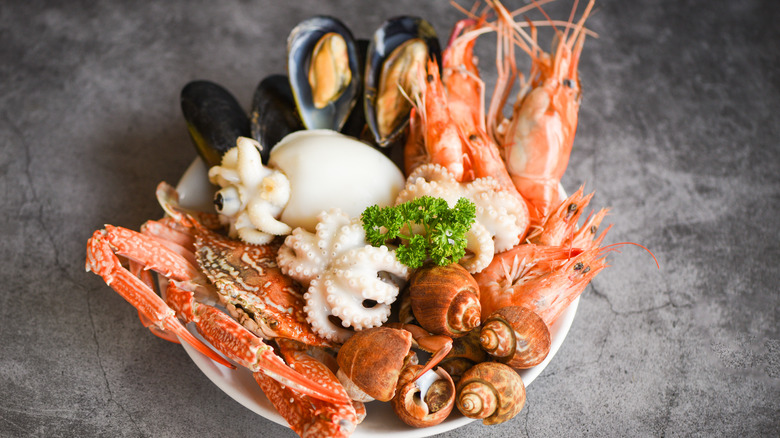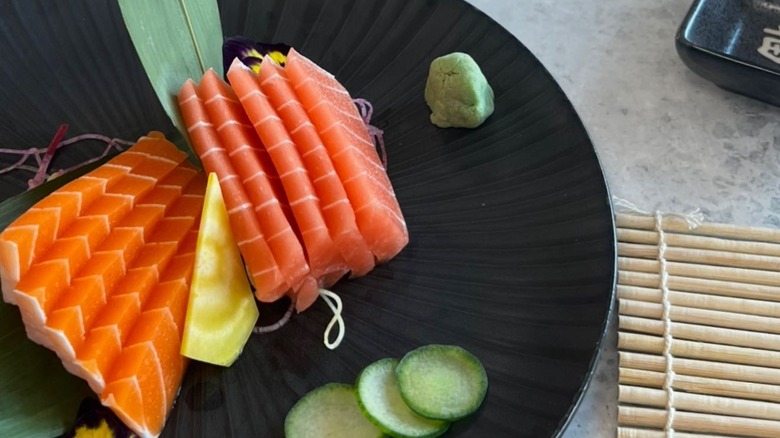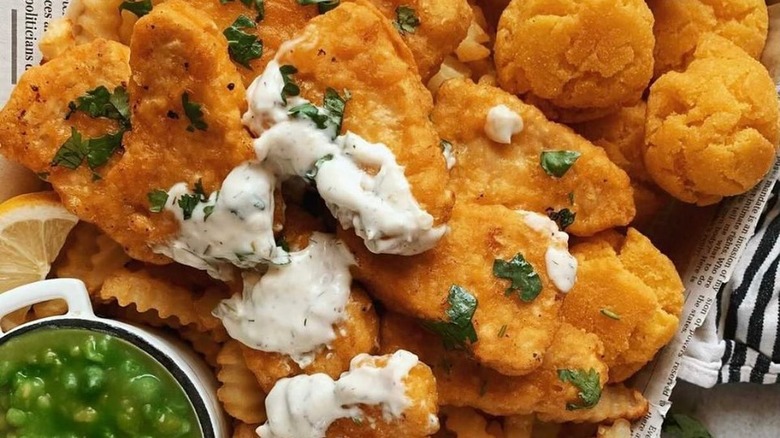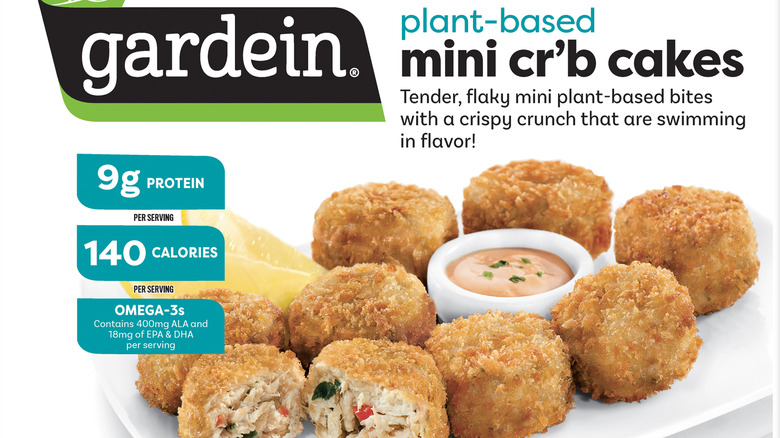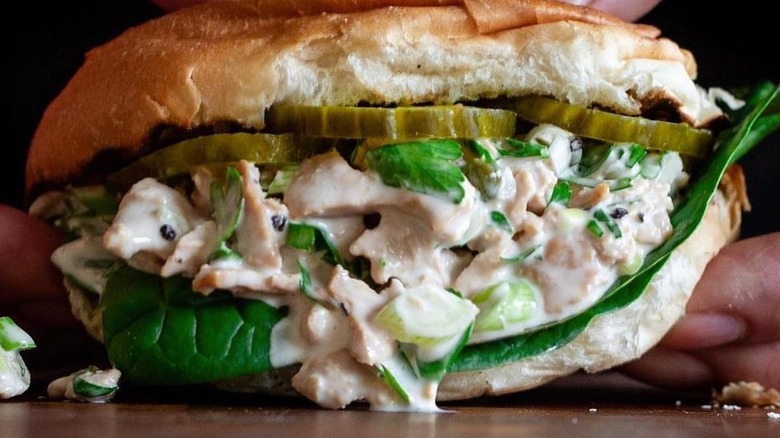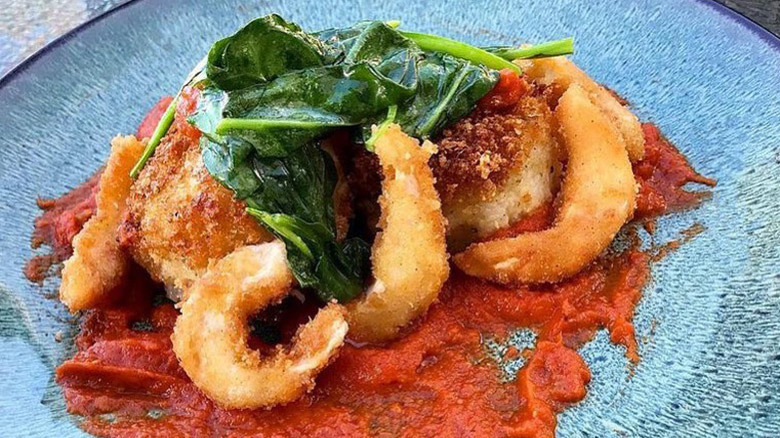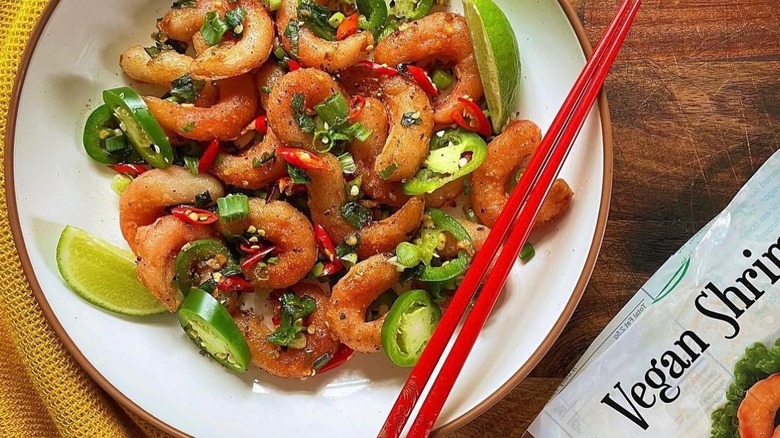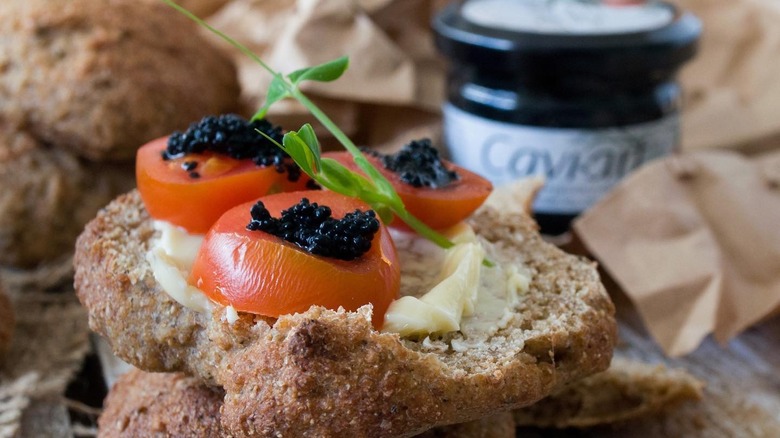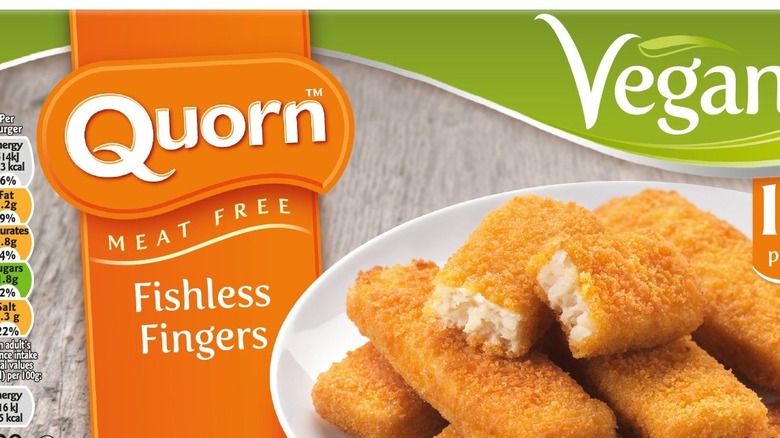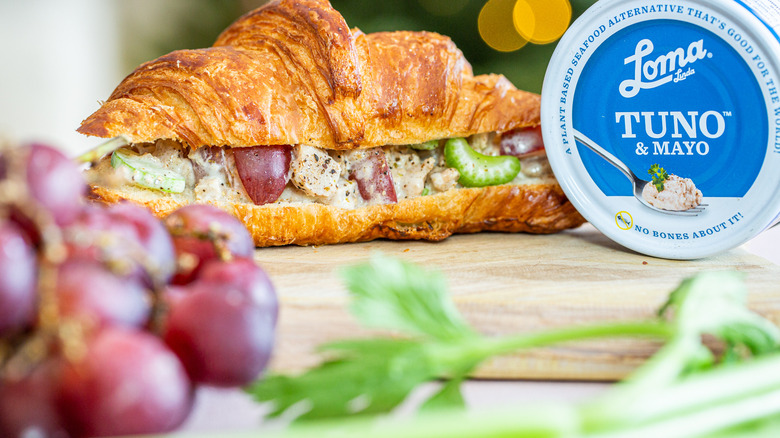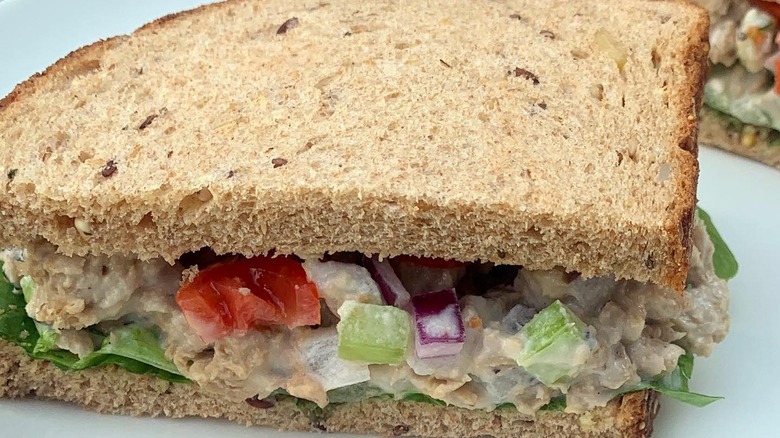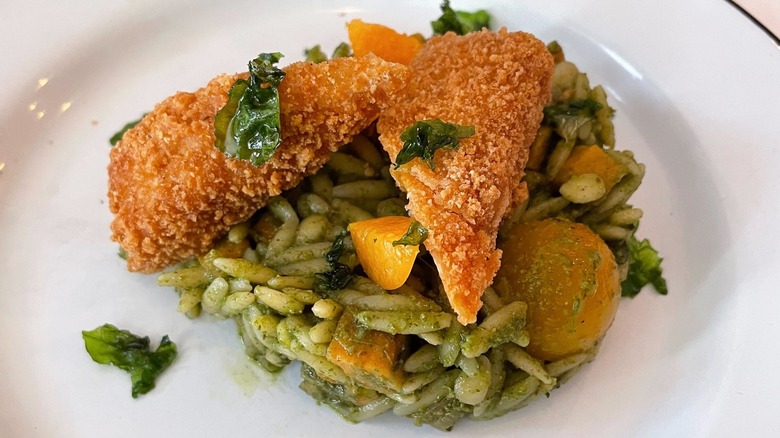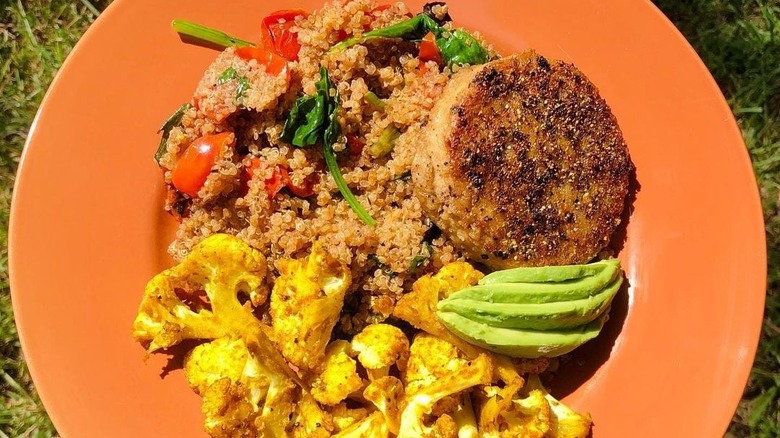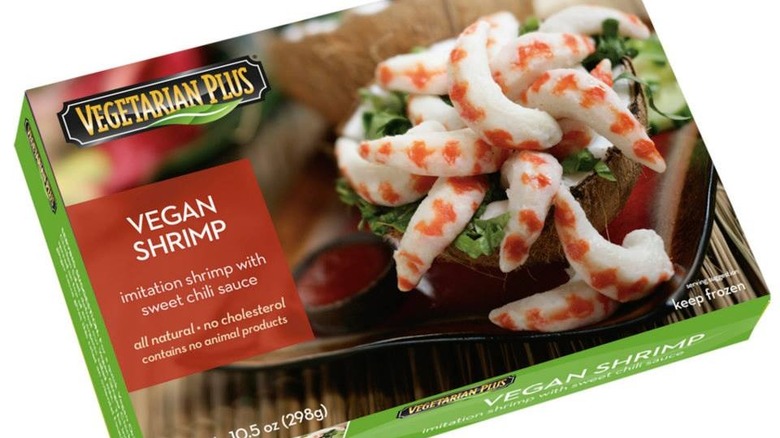Vegan Seafood Options You Should And Shouldn't Buy
The documentary "Seaspiracy" on Netflix flipped the script regarding safe and sustainable seafood. With its deep dive into the unethical world of sourcing seafood, pollution of the fragile ocean, and poor treatment of its workers, the documentary prompted a change of diet for many people. Sustainability groups and activists began public pleas for others to change their eating habits, as well, by providing lists of top seafood to avoid, and more. Seafood fans across the globe cut out seafood entirely, or went on a brief hiatus, while others began looking for alternatives to suit their cravings.
Enter, the plant-based food market. Plant-based alternatives have grown in popularity in recent years, with a focus on replacements for beef, chicken, and yes, even seafood. In 2020, plant-based meat sales in the United States grew up to $7 billion in value, which was a 20% growth from the previous year. Experts anticipate the plant-based meat and seafood market will continue this pattern and may reach over $450 billion in value by the year 2040. With it, shoppers can expect to see more plant-based seafood products on shelves. Here are some of the vegan seafood options that you should try, and some that you'll do best to avoid.
Zeastar sashimi salmon
Starting with a real winner is the vegan Zeastar "zalmon" sashimi. This product is designed to mimic sashimi salmon and has been reviewed by several vegan seafood aficionados. Sashimi is a popular food on its own, but also pairs quite well inside of sushi rolls, in a salad, or even as a main feature in an entree. It has received overwhelmingly positive feedback, likely because Zeastar provides a texture to this salmon lookalike that is very close to the real thing, with natural-looking lines and all. Furthermore, tasters claim that the texture is spot on, with a palatable flavor. One reviewer suggested marinating it in a bit of soy sauce and claims that with that extra step, it truly is interchangeable with real salmon sashimi.
The zalmon is made with water, trehalose, tapioca starch, konjac powder, and a few oils and colors from spices like paprika and red iron oxide. If you also were not familiar with trehalose, it is a form of glucose that occurs naturally in mushrooms, sea algae, and yeast. The konjac powder also comes from mushrooms and packs several plant-based health benefits. You can purchase the salmon lookalike at various health websites for a rather reasonalbe pirces. All in all, it's a pretty good deal for a plant-based, vegan sashimi that is very close to the real thing.
Gardein golden fishless filet
Lovers of fish and chips, unite! For many seafood lovers, there's not much that compares to a classic battered-and-fried fish fillet. Whether in sandwich form, à la carte with sides like coleslaw or "chips" (french fries), or as a midday snack, sometimes you just need delicious, fried, and crispy goodness in your seafood. For a plant-based and vegan option, look no further than the Gardein Golden F'sh Filet. This is a product that had highly positive reviews from various sources, all of whom praised its likeness to the classic fried fish from their past. Even a pair of reviewers who basically hated every other plant-based option that they tried loved Gardein and said they would buy it again. When the naysayers jump on board, that's a good indication that it's worth its salt.
Gardein's F'sh Filet is completely vegan, with ingredients like soy protein, wheat flour, and potato starch. Obviously, this would not be a safe pick for those with allergies to soy, or for those who have gluten allergies/intolerance, but it is a great option for those who just want a plant-based, fried and battered fish fillet. Furthermore, you can find it at most grocery stores and retail stores, and the price is competitive, at less than five dollars per box for 10 ounces of fake fish.
Gardein crab cakes
Gardein strikes gold again with its vegan and plant-based crab cakes. Several YouTube foodies reviewed these and claimed that they were almost indistinguishable from real crab cakes when paired with tartar sauce. One group even ran a blind taste test, and their participants immediately guessed that these were crab cakes, which was unique from many of their other tastes of plant-based seafood. The Gardein crab cakes seem to be a hit even with the most selective of taste-testers and are definitely a vegan seafood product to add to your must-try list.
The crab cakes' ingredients are based on wheat and gluten, utilizing wheat flour, chickpea flour, corn starch, and vegetables like bell peppers and green onion. While it would not be an option for individuals with allergies, it seems that the Gardein Cr'b Cakes are an excellent choice and seafood alternative for vegans who don't mind the gluten factor. Regarding presentation, these crab cakes are beautifully interchangeable as a stand-alone entree, or the main feature of a po' boy or a sandwich. Heck, even a crab cake salad or pasta dish could be delicious. The price is reasonable, at less than five dollars per box, and you can find them at most grocery stores (including Instacart), and online through Amazon and similar retailers.
Good Catch canned tuna
Good Catch offers a canned non-tuna that is made completely of plant protein. Its recipe includes both soy and pea protein, chickpea flour, protein from lentils and fava beans, and navy bean flour. The company also uses gluten-free yeast extract and seaweed powder. By providing a vegan and gluten-free seafood alternative, Good Catch has made its way to the top of the list of vegan seafood products that you should absolutely buy. The reviews for its fish-free tuna are almost completely positive, which seem to suggest vegans and non-vegans alike can enjoy this non-tuna product.
Some Amazon customers shared their success of making this into a delicious tuna salad with mayo, using it for a tuna melt, and making tuna and potato cakes. Others reviewed it as being the closest vegan alternative to tuna that they've found so far and said it is wonderful on top of a salad. The price is also manageable, at around four dollars for a three-ounce pack, and it is also sold by the case online for around $30 for a six-pack. With its recipe versatility, its flavor, and its price tag, Good Catch's non-tuna is an easy vegan seafood to recommend.
Sophie's Kitchen battered shrimp
A well-loved seafood classic is battered shrimp. Fried to a perfect, golden crisp and served with cocktail and/or tartar sauce, fried shrimp is a popular favorite, and oh-so-delicious. Sophie's Kitchen is one of the few companies to launch a vegan and fish-free battered shrimp that has pleased the masses. Sophie's Kitchen recommends using it for sushi, tacos, curry, and more, and highlights that it is not only vegan but also gluten-free, soy-free, and non-GMO. Delightful.
This shrimp lookalike can be found online or in stores, and on average, costs around $4.99, although this price can vary per store. Reviews seem to favor the vegan shrimp option, with one YouTuber who loved it in a shrimp scampi pasta, while a blogger served it up cocktail style with horseradish and cocktail sauce. Other reviews sang its praises as well, and recommend cooking it a bit longer to boost the crispiness to your liking. Sophie's Kitchen has made vegans proud with the battered non-shrimp, making it a product that is definitely worth buying.
All Vegetarian Inc. shrimp
One seafood item that is popular in most foodie groups is classic, boiled shrimp. This is a staple of a good seafood broil, a party dish paired with cocktail sauce, and an ingredient in pastas, chowders, and more. Thankfully, there is a pretty good vegan option, by Vegetarian Inc. While its name caters to vegetarians, vegans can also find foods to love in its brand, including the vegan imitation shrimp.
Its ingredient list is less complex than some, focusing mainly on pea extract and seaweed extract, with a smidge of modified starch. Soy-free and gluten-free, Vegetarian Inc's imitation shrimp comes in bags of about 18 pieces, and sells for around $13 per bag.
It's a bit more expensive than some plant-based seafood options, but reviewers give the imitation shrimp plenty of praise, including comments on its texture and taste, which are comparable to the real thing, as well as the vegan shrimp's versatility. Some reviewers used it for a seafood salad, while others made summer rolls. A blind taste test led to participants agreeing that it had a similar "pop" to natural shrimp, and that it came close to the real thing, while not a perfectly convincing replacement. One thing many of the reviews seemed to agree upon was that it is easy to cook with. It's simple and versatile, if not a bit expensive, and receives our stamp of approval.
Caviart Seaweed Caviar
For the fancy and highly refined of pallets (or at least the most financially equipped), is the famous caviar. Served on mega yachts and fine dining establishments across the globe, caviar is a popular cracker topping for parties, banquets, and fundraisers where the caterers aim to impress. With the natural form consisting of fish eggs or roe (possible ick factor for some), there is a market that craves the luxurious topping, in plant-based form. Hence, the creation from Caviart. Caviart makes plant based foods with artistic creativity, as they created a mock caviar that is fully vegan and compares to the real thing's flavor through a salty, briny taste.
Caviart offers alternatives for classic caviar, caviar for sushi, and seaweed pearls. Its seaweed and kelp-based caviar is one of the most popular and well-reviewed of its products, and comes in different flavors, including black seaweed, pink seaweed, wasabi, and more. The company sells exclusively to retail outlets, and provides 100-gram jars, that are sold at grocery stores and websites like Amazon. On Amazon, for instance, you can purchase a smaller jar for around $11, and can see the many positive reviews that have landed this item four stars. If caviar is your thing, it sounds like Caviart offers a promising vegan product for you and your guests.
Quorn fishless sticks
Quorn is a well-established company that provides vegan seafood lovers with a childhood classic – fish sticks. Of course these are fishless fish sticks. Quorn's transparency about its ingredients initially threw off a few buyers, when it divulged its usage of mycoprotein. Mycoprotein is a fungus, but the good kind, packed with healthy benefits. It is high in protein and fiber, and is a big part of how Quorn creates its meat substitutes. The main ingredients in its fishless fish sticks are wheat, rice, and of course, mycoprotein. This has led to a close, if not perfect texture to resemble the real taste of beloved fish sticks.
One reviewer says that Quorn's version comes very close, but that the recipe could use improvement. Others are very pleased with the fish-alternative sticks and say that "it tastes very similar to battered fish" with a "perfect, crispy coating." Some reviews suggest pairing the fishless sticks with a sauce like tartar or ketchup, which probably went without saying. (Aren't fish sticks a tartar sauce delivery-mechanism anyway?)
You can find Quorn fishless sticks at most grocery stores, via Instacart, and they typically sell for around five to seven dollars, with 10 sticks in each box. With the mostly positive reviews, and reasonable price point, Quorn's fishless sticks definitely make the list of products to try.
Loma Linda tuno
You read that right – "tuno." Tuno is Loma Linda's solution to a plant-based, vegan version of canned tuna. Loma Linda is partly funded by the guy who used to work behind the scenes of Bumble Bee's brand of seafood. He made the switch over to Loma Linda to work towards environmentally sustainable alternatives, that wouldn't hurt the oceans, which is pretty admirable. Part of this noble transition led to the creation of the tuno that unfortunately, did not gain the admiration of many customers.
The composition of Loma Linda's tuno is a simple combination of sunflower oil, soy, and yeast. A journalist from Men's Health snagged a sample of the tuno, and gave it a taste right out of the can, with no dressing or snazzy accoutrement. Apparently, "not even mayo or seasoning could help the tuno, as it tasted like soggy croutons in tuna-flavored water." It seems that the flavored versions were more palatable, but still not a deadringer for the real thing. Other reviews said it "looked like jelly was added to the can" which undoubtedly made it less appetizing. Its price is modest, at less than two dollars per can, but it is at inadvisable buyer discretion if they dare to give this particular product a go.
Sophie's Kitchen canned tuna
There is a great deal of gratitude owed to those who taste test and share their results for the world to see. Such a gracious act can often save the public from enduring unpleasant meals, as was apparently the case with Sophie's Kitchen's version of canned tuna. This may come as a surprise, considering just earlier we shared the wild success of Sophie's battered shrimp. Alas, it seems the tuna does not live up to its shrimpy comrade.
A brave taste-tester tried out the black pepper "toona," and rated it a 5 out of 10. While that is certainly not the worst score, it did pale considerably to the other brands that were sampled. The main issues reportedly lay in the overwhelming fishy flavor and smell, and the undesirable texture. Other comments compared the "toona" to seitan, the cooked wheat gluten mush of gluten intolerant nightmares. The non-tuna also comes in a bit high on price compared to its competition, at close to four dollars a can. However, Sophie's Kitchen does ensure that this product is soy-free, gluten-free, and non-GMO, so it could still be an option for allergy sufferers who need a backup plan.
Sophie's vegan fish fillet
It's a comfort to know that there are multiple companies out there which cater to the desires of vegans who want their fried fish craving quelled. Sophie's Kitchen comes through as another contender for a fried and battered fish fillet, but perhaps not to the full level of success as some others. A review from several years back compared Sophie's vegan fillet, with that of Gardein's, and found that Sophie's came in second place every time.
This blogger's first complaint was the size of the fillets, which she described as "meager." Secondly, she wasn't fond of the end result, which yielded a "mushy fish cake" texture. Finally, Sophie's came in behind Gardein's with a longer preparation process. While Gardein's can be cooked straight from the freezer, Sophie's fillets have to first be thawed.
Other taste testers came to a similar conclusion about the texture, echoing that "it was just so wrong." At a moderate price of around seven dollars per box, these could be an option for gluten- and soy-free dieters, but (according to the general consensus) perhaps won't be the tastiest.
Sophie's crab cakes
Poor Sophie. It seems that aside from the well-loved battered shrimp, a few of her products are just not up to par for the vegan community to grant their favor. Nevertheless, the crab cakes exist. They are made with konjac root and pea protein, and are totally gluten-free, which is not the case with most crab cakes on the market. While that is a selling point for many, it seems that the taste does not hold up to that of competition.
Customer reviews from Amazon are quick to criticize the crab cakes for being "pasty, stringy, and starchy." Some claimed the crab cakes "tasted like sawdust" while others dramatically declared their desire to "throw away 25-years of vegetarianism if it means they never have to eat these again!" Yikes. There are thankfully, some less-harsh reviews out there, like the lifetime vegan blogger whose only complaint was their small size. Of course, she acknowledges that her expertise is limited, having never eaten a real crab cake to compare them to. With the slightly higher price tag of eight to ten dollars per box, and the questionable reviews, this would be a plant-based seafood product to pass on.
Vegetarian Plus vegan shrimp
Vegetarian Plus (not to be confused with Vegetarian Inc.) is under the umbrella of "Vege USA," which also provides "VeriSoy" as an additional slew of vegetarian and vegan options. The vegan shrimp comes as an addition to an already established plant-based meat assortment. In one taste test, the vegan shrimp was poorly reviewed as having a "bad texture." A YouTuber shared this sentiment, saying that it was "extremely rubbery," which is apparent from the close-up shot of it stretching from her teeth. She goes on to say that "it looks like a shrimp, but it does not taste like a shrimp."
Vegetarian Plus makes its shrimp from modified starch, pea extract, seaweed extract, and brown sugar, and claims to be available via Instacart (although it seems to be unavailable in some areas). Rubbery as it may be, Vegetarian Plus's vegan shrimp is yet another plant-based and vegan option, even if it may not be the most appetizing option on the market.
